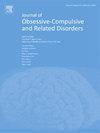Behavioral avoidance as a factor in concentrated exposure and response prevention for obsessive-compulsive disorder
Abstract
Although exposure and response prevention (ERP) is recommended for adults with obsessive-compulsive disorder (OCD), some recipients do not fully respond while others improve and subsequently relapse. Identifying factors associated with poor outcomes is therefore highly important. We investigated behavioral avoidance as one potential factor. Data came from a large randomized controlled trial that delivered a concentrated ERP protocol over the course of four consecutive days in accord with the Bergen 4-Day Treatment (B4DT). Avoidance was assessed with the auxiliary item from the Yale-Brown Obsessive-Compulsive Scale (YBOCS). Although behavioral avoidance did not predict acute outcome at immediate post-treatment, patients with substantial avoidance behaviors prior to treatment had worse long term (12-month) outcomes (increased OCD severity and greater functional impairment), after controlling for OCD severity at baseline. Avoidance significantly decreased from pre-to post-treatment but increased from post-treatment to 3-month and 12-month follow-up. Change in avoidance from post-treatment to 3-month follow-up predicted subsequent OCD worsening at 12-months, after controlling for change in global OCD severity. Results suggest that avoidant patients can benefit from concentrated ERP but may be at increased risk of poorer long-term outcomes. Future work should investigate strategies to identify and ameliorate worsening avoidance to reduce relapse.

 求助内容:
求助内容: 应助结果提醒方式:
应助结果提醒方式:


